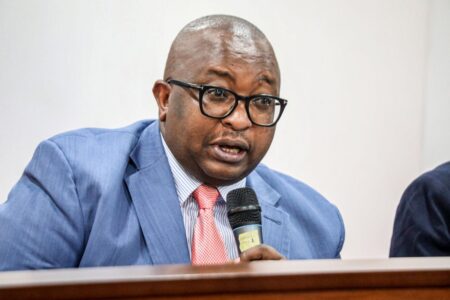The government is investing Sh20 billion raised from the affordable housing levy in treasury bills and bonds, indicating a low absorption rate of funds allocated to build cheaper homes for low- and middle-income families.
Bonds are medium to long-term government securities and purchasing them indicates that the government is collecting tax faster than it can deploy it in building homes.
The State Ministry of Housing says the government has collected a total of Sh34.72 billion by the end of April 2024.
Housing Principal Secretary Charles Hinga told the National Assembly Housing, Urban Planning and Public Works Committee that Sh6.93 billion has been spent from the fund so far.
He said that out of the total collections, Sh20 billion had been transferred to the Affordable Housing Board for investment in treasury bills and bonds. Most future collections are also set to be placed in debt securities first, helping fund the government as housebuilding takes a back seat due to a legal hurdle.
The fund is derived from the mandatory monthly deduction of 1.5 percent of the employee's gross salary matched by the employer.
“New funds after the Affordable Housing Fund Act came into effect on March 19, 2024, are now being raised under the Affordable Housing Fund Board,” Mr Hinga said.
“The council has written to the treasury to open an account at the Central Bank of Kenya to collect the tax.”
He said that the Treasury gave the Board of Directors directions to invest all tax revenues in Treasury bills and bonds.
“The first Sh20 billion is directed to invest in treasury bonds and bills. The board needs to open an account at the Central Bank of Kuwait to receive the funds,” Mr Hinga said.
He told the committee chaired by Imurua Dekker MP Johanna Ngeno that the Affordable Housing Act puts the responsibility of the board in determining how the money is spent. He said the board had not yet received an investment plan.
“The law envisages a situation where the board can allocate funds for projects to be developed on private lands. But they have not been able to receive funds from the Housing Tax Board,” Mr. Hinga said.
Mr Hinga told MPs that until Parliament amends the law to give the board powers to spend the money, the council cannot use housing tax money.
“The board can only invest money in Treasury bonds because it is not an executive agency. The law does not provide a way for the board to spend the money,” he added.
“Starting this week, the Board will write to the implementing agencies to submit their five-year investment plans. The Board is not an implementing agent. All implementing agents will have to prepare their proposed projects.
He said the council would be asked to submit five-year plans and budgets from various implementing agencies to the Cabinet and Parliament for scrutiny.
Mr Hinga said the Affordable Housing Council is expected to receive Sh63.22 billion from the affordable housing levy in the 2024/25 financial year which begins in July.
Of the Sh63.22 billion, Sh32.5 billion has been allocated for construction of affordable housing, Sh15 billion for social housing, Sh1 billion for construction of police housing, and Sh14.66 billion for social and physical infrastructure.
Kenyans are expected to pay between Sh840,000 and Sh5.76 million for the low-cost homes programme, which targets creating 250,000 units every year. The affordable housing units will consist of studios, two- and three-bedroom apartments. Meanwhile, social housing, the lowest level of the programme, will consist of one-, two- and three-room houses aimed at slum dwellers.
In addition, the program will oversee the development of residential units that will consist of two- and three-bedroom homes.
“On average, we collect Sh5.5 billion per month from the affordable housing levy,” Mr Hinga said while defending the Ministry of Foreign Affairs’ budget for the 2024/25 financial year.
“The money is no longer allocated to the Ministry of Housing but to the Board of Directors. “I will have to go to the board for funding just like other implementing agencies like the National Housing Corporation,” he said.
Mr Hinga said before the tax was imposed, the Treasury allocated the Ministry of Lands, Public Works and Housing Sh13 billion annually but has now reduced it to Sh2 billion. He said the Treasury had paid the State Department to the Housing Tax Board.
“I came to this committee to dismantle my budget. Everything has been taxed. I wouldn't be able to function if my budget was tied to the housing tax.”
“If this committee does not separate my budget from the housing tax, I will not have money to spend. The Treasury has combined my budget with the housing tax. You must help me,” said the Principal Secretary.
